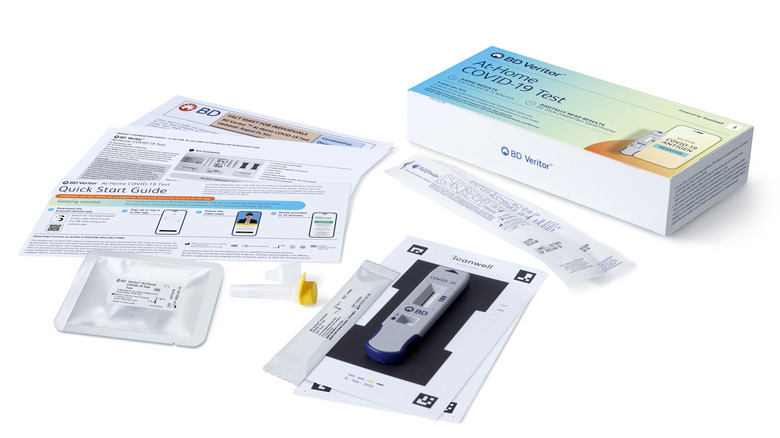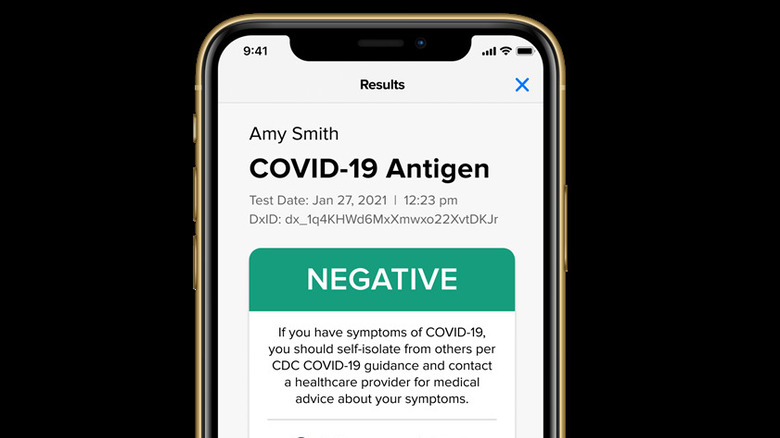Dr. Jeff Andrews Talks About The Rising COVID Cases And How To Stay Safe - Exclusive Interview
We are still very much in a pandemic, and with mask mandates gone and COVID cases on the rise across America, you may be wondering how to stay safe this summer. It can be hard to tell the difference between COVID and a cold or allergies, and some tests are more reliable than others.
To address these issues, we spoke to Dr. Jeff Andrews, the Medical Affairs Vice President at BD Integrated Diagnostics Solutions, a product and service company that supports healthcare providers. BD sells many health healthcare items, including rapid at-home COVID tests. Andrews has over 30 years of clinical experience, as well as 20 years of research, education, and administration experience at Duke University and Vanderbilt University. His current focus at BD is on the COVID-19 pandemic response and infectious disease testing. In our exclusive email interview with him, Dr. Andrews shared his tips for how to avoid getting COVID, notes on the reliability of COVID tests, and his thoughts on the future of the pandemic.
How to stay safe
With the wide spectrum of COVID symptoms, it can be hard to tell whether you have COVID or if it might be allergies, a cold, or some other condition. How can you tell the difference?
It can be incredibly challenging for medical providers and patients to differentiate between COVID-19 symptoms and symptoms of other very common upper respiratory complaints like influenza, allergies, and the common cold. This is because many of these symptoms overlap and are present in several of these complaints (e.g., coughing, sneezing, sore throat, etc.). The best way for clinicians and patients to know is to test. This is increasingly true during respiratory season (October-May) in the United States where many of these viruses and conditions are co-circulating.
Many of us are looking forward to summer vacations. With mask mandates no longer in effect, do you have any tips on how to protect yourself and your loved ones while traveling?
Remaining in compliance with vaccination recommendations by the CDC is the single most effective way to protect oneself from COVID-19 while traveling. Currently, the CDC recommends COVID-19 vaccines, including boosters, for everyone ages 5 years and older.
Outside of vaccination, individuals can still elect to personally wear masks and socially distance when able to decrease their risk of becoming infected. I also recommend everyone, but especially travelers, keep a few at-home COVID-19 tests in their suitcase or medicine cabinet in case they wish to test themselves prior to visiting loved ones or if they develop symptoms. If positive, you should speak to your doctor as soon as possible, as there are now FDA-authorized medications available for treatment of COVID-19.
Do you have any general tips for how to avoid getting COVID this summer?
Stay up to date with recommended COVID-19 vaccination guidance from the CDC, wear masks and socially distance when able, avoid crowds or heavily populated indoor spaces, and keep a few rapid at-home tests available in your medicine cabinet to test any individuals in your household that develop symptoms.
COVID testing reliability
With COVID cases on the rise, what does that mean for the future of testing? Do you think we will once again see a shortage of at-home tests and long lines at testing sites?
The recent rise in daily cases conveys a continued need for accessible COVID-19 testing that will likely persist well into 2023. The need for continued testing accessibility is even more pronounced now that we have FDA-authorized medications for treatment of COVID-19. Furthermore, the virus will have a better opportunity to spread during the cooler winter months when people congregate indoors, especially since mask mandates and other mitigation measures are not being enforced.
At BD, we do not anticipate any supply issues [in] delivering COVID-19 tests to our customers.
Several scientific studies, along with the FDA, report that some at-home COVID tests can be unreliable. Do you agree?
No test for COVID-19 is 100% accurate. I would have to review each of these referenced studies and reports on a case-by-case basis to provide an accurate response to each of these allegations. Overall, I would suggest that the FDA insists on the withdrawal of any unreliable test; therefore, the tests [that] have been approved in the past and remain in the marketplace are likely to be reliable.
Are there certain types of at-home COVID tests that are more reliable than others?
There are two types of rapid at-home COVID tests available: Rapid Molecular At-Home Tests and Rapid Antigen At-Home Tests.
Rapid-molecular at-home tests tend to be slightly more sensitive but cost more and take a longer time to process. Rapid antigen at-home tests are slightly less sensitive than rapid molecular at-home tests but tend to be more affordable and have slightly faster result processing times.
Can you still use an at-home COVID test after it has expired?
No. Individuals should not use any at-home COVID-19 test past the expiration date stated on the outside of the box.
The future with COVID
If someone has COVID symptoms but tests negative on an at-home test, what should they do?
While it is possible for at-home tests to incorrectly identify a symptomatic individual as negative when they are truly positive, it is also possible their symptoms are related to a separate diagnosis (e.g., seasonal allergies, common cold, flu). If someone has doubts or concerns about the result of their at-home test, they should follow up with their medical provider for further guidance. In large studies of non-hospitalized patients, symptomatic patients have COVID-19 prevalence in the range of 5-20%, so it is not surprising if a symptomatic person tests negative, given the overlapping symptoms.
If someone in your household tests positive for COVID, what prevention tips do you recommend for the health and safety of others in the house?
I would recommend positive individuals immediately isolate from others in their household and meet with a medical provider to discuss their result and potentially receive FDA-authorized treatments. I also recommend close contacts get tested as soon as possible and avoid close contact with the infected individual as much as possible, especially in closed indoor spaces.
What are the current barriers and accessibility issues for COVID testing? How are these issues being remedied?
There have been several issues and barriers regarding at-home test reimbursement. Reimbursement rates and the steps to file for reimbursement vary [from] plan to plan. At BD, we provide support to customers interested in filing for reimbursement for their BD Veritor™ At-Home COVID-19 Test, which was EUA authorized by the FDA, and have step-by-step instructions available on our website: https://www.bdveritorathome.com/en-us/reimbursement.
Do you see a light at the end of the tunnel, or do you think COVID-19 is now always going to be a part of our daily lives?
It is very difficult for me to provide a confident answer on this question. This virus has continually demonstrated it is far from predictable. That said, my thoughts are aligned with the CDC's prediction that COVID-19 will eventually become an endemic seasonal respiratory virus like we see each year with influenza. We will likely see rises and spikes in cases during the cooler winter months and [fewer] cases in the warmer summer months.
To learn more about BD, please visit https://www.bd.com/en-us. Follow BD on LinkedIn, Twitter, and Instagram.
This interview was edited for clarity.




